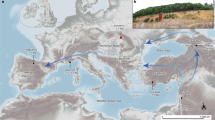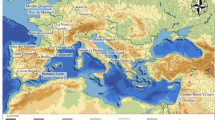Abstract
FOR many years it was the custom to regard the line of separation of the Palæolithic and Neolithic periods as roughly corresponding to the geological division between the Pleistocene and Holocene; and even Mr. Peake's excellent historical summary (NATURE, Jan. 20, p. 104) does not make it clear why this position was ever abandoned. It is unsatisfactory, and a source of confusion, that the term Neolithic should be used in a broad sense by one generation, and in a very narrow one by the next—that in one case it covers several thousand years in many different lands, while in the other it varies enormously in length in different countries, and in England (where the term originated) it is whittled down to a few decades, with some risk of complete disappearance.
This is a preview of subscription content, access via your institution
Access options
Subscribe to this journal
Receive 51 print issues and online access
$199.00 per year
only $3.90 per issue
Buy this article
- Purchase on Springer Link
- Instant access to full article PDF
Prices may be subject to local taxes which are calculated during checkout
Similar content being viewed by others
Author information
Authors and Affiliations
Rights and permissions
About this article
Cite this article
BURY, H. The Term ‘Mesolithic’. Nature 133, 259–260 (1934). https://doi.org/10.1038/133259c0
Issue Date:
DOI: https://doi.org/10.1038/133259c0
Comments
By submitting a comment you agree to abide by our Terms and Community Guidelines. If you find something abusive or that does not comply with our terms or guidelines please flag it as inappropriate.



